+ Open data
Open data
- Basic information
Basic information
| Entry | Database: PDB / ID: 7qol | ||||||
|---|---|---|---|---|---|---|---|
| Title | Tail assembly of the phicrAss001 virion with C6 symmetry imposed | ||||||
 Components Components |
| ||||||
 Keywords Keywords |  VIRUS / crAssphage / VIRUS / crAssphage /  bacteriophage / bacteriophage /  DNA virus / portal / connector / DNA virus / portal / connector /  tail / ring / muzzle tail / ring / muzzle | ||||||
| Function / homology |  Function and homology information Function and homology informationvirus tail / biological process involved in interaction with host / host cell membrane /  viral life cycle / viral life cycle /  virion component / virion component /  viral capsid / symbiont entry into host cell / viral capsid / symbiont entry into host cell /  membrane membraneSimilarity search - Function | ||||||
| Biological species |  Bacteroides phage crAss001 (virus) Bacteroides phage crAss001 (virus) | ||||||
| Method |  ELECTRON MICROSCOPY / ELECTRON MICROSCOPY /  single particle reconstruction / single particle reconstruction /  cryo EM / Resolution: 3.33 Å cryo EM / Resolution: 3.33 Å | ||||||
 Authors Authors | Bayfield, O.W. / Shkoporov, A.N. / Yutin, N. / Khokhlova, E.V. / Smith, J.L.R. / Hawkins, D.E.D.P. / Koonin, E.V. / Hill, C. / Antson, A.A. | ||||||
| Funding support |  United Kingdom, 1items United Kingdom, 1items
| ||||||
 Citation Citation |  Journal: Nature / Year: 2023 Journal: Nature / Year: 2023Title: Structural atlas of a human gut crassvirus. Authors: Oliver W Bayfield / Andrey N Shkoporov / Natalya Yutin / Ekaterina V Khokhlova / Jake L R Smith / Dorothy E D P Hawkins / Eugene V Koonin / Colin Hill / Alfred A Antson /    Abstract: CrAssphage and related viruses of the order Crassvirales (hereafter referred to as crassviruses) were originally discovered by cross-assembly of metagenomic sequences. They are the most abundant ...CrAssphage and related viruses of the order Crassvirales (hereafter referred to as crassviruses) were originally discovered by cross-assembly of metagenomic sequences. They are the most abundant viruses in the human gut, are found in the majority of individual gut viromes, and account for up to 95% of the viral sequences in some individuals. Crassviruses are likely to have major roles in shaping the composition and functionality of the human microbiome, but the structures and roles of most of the virally encoded proteins are unknown, with only generic predictions resulting from bioinformatic analyses. Here we present a cryo-electron microscopy reconstruction of Bacteroides intestinalis virus ΦcrAss001, providing the structural basis for the functional assignment of most of its virion proteins. The muzzle protein forms an assembly about 1 MDa in size at the end of the tail and exhibits a previously unknown fold that we designate the 'crass fold', that is likely to serve as a gatekeeper that controls the ejection of cargos. In addition to packing the approximately 103 kb of virus DNA, the ΦcrAss001 virion has extensive storage space for virally encoded cargo proteins in the capsid and, unusually, within the tail. One of the cargo proteins is present in both the capsid and the tail, suggesting a general mechanism for protein ejection, which involves partial unfolding of proteins during their extrusion through the tail. These findings provide a structural basis for understanding the mechanisms of assembly and infection of these highly abundant crassviruses. #1:  Journal: Res Sq / Year: 2023 Journal: Res Sq / Year: 2023Title: Structural atlas of the most abundant human gut virus Authors: Antson, A. / Bayfield, O. / Shkoporov, A. / Yutin, N. / Khokhlova, E. / Smith, J. / Hawkins, D. / Koonin, E. / Hill, C. | ||||||
| History |
|
- Structure visualization
Structure visualization
| Structure viewer | Molecule:  Molmil Molmil Jmol/JSmol Jmol/JSmol |
|---|
- Downloads & links
Downloads & links
- Download
Download
| PDBx/mmCIF format |  7qol.cif.gz 7qol.cif.gz | 1.2 MB | Display |  PDBx/mmCIF format PDBx/mmCIF format |
|---|---|---|---|---|
| PDB format |  pdb7qol.ent.gz pdb7qol.ent.gz | 956.4 KB | Display |  PDB format PDB format |
| PDBx/mmJSON format |  7qol.json.gz 7qol.json.gz | Tree view |  PDBx/mmJSON format PDBx/mmJSON format | |
| Others |  Other downloads Other downloads |
-Validation report
| Arichive directory |  https://data.pdbj.org/pub/pdb/validation_reports/qo/7qol https://data.pdbj.org/pub/pdb/validation_reports/qo/7qol ftp://data.pdbj.org/pub/pdb/validation_reports/qo/7qol ftp://data.pdbj.org/pub/pdb/validation_reports/qo/7qol | HTTPS FTP |
|---|
-Related structure data
| Related structure data |  14094MC 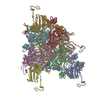 7qofC  7qogC 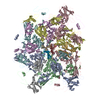 7qohC 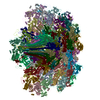 7qoiC  7qojC  7qokC M: map data used to model this data C: citing same article ( |
|---|---|
| Similar structure data | Similarity search - Function & homology  F&H Search F&H Search |
- Links
Links
- Assembly
Assembly
| Deposited unit | 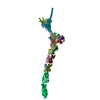
|
|---|---|
| 1 | x 6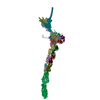
|
- Components
Components
-Protein , 4 types, 13 molecules AOJKLbcdMNefP
| #1: Protein | Mass: 93122.211 Da / Num. of mol.: 2 / Source method: isolated from a natural source / Source: (natural)  Bacteroides phage crAss001 (virus) / References: UniProt: A0A385DT68 Bacteroides phage crAss001 (virus) / References: UniProt: A0A385DT68#8: Protein | Mass: 92401.672 Da / Num. of mol.: 6 / Source method: isolated from a natural source / Source: (natural)  Bacteroides phage crAss001 (virus) / References: UniProt: A0A385DVT1 Bacteroides phage crAss001 (virus) / References: UniProt: A0A385DVT1#9: Protein |  / Cargo protein C1 gp45 / Cargo protein C1 gp45Mass: 90913.836 Da / Num. of mol.: 4 / Source method: isolated from a natural source / Source: (natural)  Bacteroides phage crAss001 (virus) / References: UniProt: A0A385DV85 Bacteroides phage crAss001 (virus) / References: UniProt: A0A385DV85#10: Protein | | Mass: 156459.312 Da / Num. of mol.: 1 / Source method: isolated from a natural source / Source: (natural)  Bacteroides phage crAss001 (virus) / References: UniProt: A0A385DVD6 Bacteroides phage crAss001 (virus) / References: UniProt: A0A385DVD6 |
|---|
-Ring protein ... , 4 types, 10 molecules BQCSDTEFUV
| #2: Protein | Mass: 27479.625 Da / Num. of mol.: 2 / Source method: isolated from a natural source / Source: (natural)  Bacteroides phage crAss001 (virus) / References: UniProt: A0A385DT91 Bacteroides phage crAss001 (virus) / References: UniProt: A0A385DT91#3: Protein | Mass: 26216.832 Da / Num. of mol.: 2 / Source method: isolated from a natural source / Source: (natural)  Bacteroides phage crAss001 (virus) / References: UniProt: A0A385DT87 Bacteroides phage crAss001 (virus) / References: UniProt: A0A385DT87#4: Protein | Mass: 26076.506 Da / Num. of mol.: 2 / Source method: isolated from a natural source / Source: (natural)  Bacteroides phage crAss001 (virus) / References: UniProt: A0A385DV73 Bacteroides phage crAss001 (virus) / References: UniProt: A0A385DV73#5: Protein | Mass: 26680.965 Da / Num. of mol.: 4 / Source method: isolated from a natural source / Source: (natural)  Bacteroides phage crAss001 (virus) / References: UniProt: A0A385DVC3 Bacteroides phage crAss001 (virus) / References: UniProt: A0A385DVC3 |
|---|
-Tail hub protein ... , 2 types, 6 molecules GHWZIa
| #6: Protein | Mass: 24813.201 Da / Num. of mol.: 4 / Source method: isolated from a natural source / Source: (natural)  Bacteroides phage crAss001 (virus) / References: UniProt: A0A385DTH1 Bacteroides phage crAss001 (virus) / References: UniProt: A0A385DTH1#7: Protein | Mass: 13411.116 Da / Num. of mol.: 2 / Source method: isolated from a natural source / Source: (natural)  Bacteroides phage crAss001 (virus) / References: UniProt: A0A385DVM6 Bacteroides phage crAss001 (virus) / References: UniProt: A0A385DVM6 |
|---|
-Protein/peptide , 1 types, 1 molecules R
| #11: Protein/peptide | Mass: 1209.482 Da / Num. of mol.: 1 / Source method: isolated from a natural source / Source: (natural)  Bacteroides phage crAss001 (virus) Bacteroides phage crAss001 (virus) |
|---|
-Non-polymers , 2 types, 4 molecules 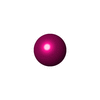


| #12: Chemical | | #13: Water | ChemComp-HOH / |  Water Water |
|---|
-Details
| Has ligand of interest | N |
|---|
-Experimental details
-Experiment
| Experiment | Method:  ELECTRON MICROSCOPY ELECTRON MICROSCOPY |
|---|---|
| EM experiment | Aggregation state: PARTICLE / 3D reconstruction method:  single particle reconstruction single particle reconstruction |
- Sample preparation
Sample preparation
| Component | Name: Bacteroides phage crAss001 / Type: VIRUS / Entity ID: #1-#9 / Source: NATURAL |
|---|---|
| Molecular weight | Experimental value: NO |
| Source (natural) | Organism:  Bacteroides phage crAss001 (virus) Bacteroides phage crAss001 (virus) |
| Details of virus | Empty: NO / Enveloped: NO / Isolate: SPECIES / Type: VIRION |
| Buffer solution | pH: 7.5 |
| Specimen | Embedding applied: NO / Shadowing applied: NO / Staining applied : NO / Vitrification applied : NO / Vitrification applied : YES : YES |
Vitrification | Cryogen name: ETHANE |
- Electron microscopy imaging
Electron microscopy imaging
| Experimental equipment |  Model: Titan Krios / Image courtesy: FEI Company |
|---|---|
| Microscopy | Model: FEI TITAN KRIOS |
| Electron gun | Electron source : :  FIELD EMISSION GUN / Accelerating voltage: 300 kV / Illumination mode: FLOOD BEAM FIELD EMISSION GUN / Accelerating voltage: 300 kV / Illumination mode: FLOOD BEAM |
| Electron lens | Mode: BRIGHT FIELD Bright-field microscopy / Nominal defocus max: 1500 nm / Nominal defocus min: 300 nm Bright-field microscopy / Nominal defocus max: 1500 nm / Nominal defocus min: 300 nm |
| Image recording | Electron dose: 51 e/Å2 / Detector mode: INTEGRATING / Film or detector model: FEI FALCON III (4k x 4k) |
- Processing
Processing
| Software | Name: PHENIX / Version: 1.19.2_4158: / Classification: refinement | ||||||||||||||||||||||||
|---|---|---|---|---|---|---|---|---|---|---|---|---|---|---|---|---|---|---|---|---|---|---|---|---|---|
| EM software |
| ||||||||||||||||||||||||
CTF correction | Type: PHASE FLIPPING AND AMPLITUDE CORRECTION | ||||||||||||||||||||||||
| Symmetry | Point symmetry : C6 (6 fold cyclic : C6 (6 fold cyclic ) ) | ||||||||||||||||||||||||
3D reconstruction | Resolution: 3.33 Å / Resolution method: FSC 0.143 CUT-OFF / Num. of particles: 46280 / Symmetry type: POINT | ||||||||||||||||||||||||
| Atomic model building | B value: 129 / Protocol: AB INITIO MODEL / Space: REAL | ||||||||||||||||||||||||
| Refine LS restraints |
|
 Movie
Movie Controller
Controller










 PDBj
PDBj
